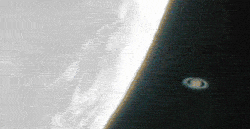Occultation
(Redirected from Occulted)
Occultation is an astronomical event that occurs when one object is hidden by another object that passes between it and the observer. The term is derived from the Latin word occultare, meaning "to conceal". This phenomenon can involve various celestial bodies, such as stars, planets, moons, and asteroids, depending on which body is being obscured.
Types of Occultations[edit | edit source]
Occultations can be categorized based on the objects involved. The most commonly observed types are:
- Lunar Occultations: When the Moon passes in front of a star or planet, temporarily obscuring it from view. These are relatively common due to the Moon's proximity to Earth.
- Solar Occultations: Occur when the Sun is obscured by the Moon during a solar eclipse. This can be either a total, partial, or annular eclipse, depending on the alignment and distances between the Earth, Moon, and Sun.
- Planetary Occultations: When a planet passes in front of a distant star. These events are less common but can provide valuable data for astronomers.
- Asteroidal Occultations: Occur when an asteroid or a dwarf planet moves in front of a star. These events can help determine the size, shape, and position of the asteroid.
Scientific Importance[edit | edit source]
Occultations are of great interest to astronomers for several reasons. They can be used to:
- Measure the size and shape of the obscuring body, especially for bodies that are too small or too distant to be resolved by telescopes.
- Detect atmospheres around planets and moons. When a star's light passes through an atmosphere during an occultation, it can reveal information about the atmosphere's composition and structure.
- Discover new objects. For example, the rings of Uranus were discovered in 1977 during a stellar occultation.
- Refine the orbits of celestial bodies. Observations of occultations provide precise measurements that can improve our understanding of the dynamics of the Solar System.
Observing Occultations[edit | edit source]
Amateur astronomers can contribute valuable observations of occultations. With a telescope and a precise clock, observers can record the exact times when an occultation begins and ends. This data can then be used to refine the positions and motions of celestial bodies.
Challenges[edit | edit source]
Observing occultations requires precise timing and positioning. The shadow path of an occultation on Earth's surface can be very narrow, and predicting the exact location and time of an occultation involves complex calculations. Weather conditions and the observer's location also play significant roles in the visibility of these events.
In Popular Culture[edit | edit source]
Occultations have been featured in various works of fiction and are often used to create dramatic or mysterious effects. While these portrayals can be entertaining, they sometimes exaggerate or misrepresent the science behind the phenomenon.
Search WikiMD
Ad.Tired of being Overweight? Try W8MD's physician weight loss program.
Semaglutide (Ozempic / Wegovy and Tirzepatide (Mounjaro / Zepbound) available.
Advertise on WikiMD
|
WikiMD's Wellness Encyclopedia |
| Let Food Be Thy Medicine Medicine Thy Food - Hippocrates |
Translate this page: - East Asian
中文,
日本,
한국어,
South Asian
हिन्दी,
தமிழ்,
తెలుగు,
Urdu,
ಕನ್ನಡ,
Southeast Asian
Indonesian,
Vietnamese,
Thai,
မြန်မာဘာသာ,
বাংলা
European
español,
Deutsch,
français,
Greek,
português do Brasil,
polski,
română,
русский,
Nederlands,
norsk,
svenska,
suomi,
Italian
Middle Eastern & African
عربى,
Turkish,
Persian,
Hebrew,
Afrikaans,
isiZulu,
Kiswahili,
Other
Bulgarian,
Hungarian,
Czech,
Swedish,
മലയാളം,
मराठी,
ਪੰਜਾਬੀ,
ગુજરાતી,
Portuguese,
Ukrainian
Medical Disclaimer: WikiMD is not a substitute for professional medical advice. The information on WikiMD is provided as an information resource only, may be incorrect, outdated or misleading, and is not to be used or relied on for any diagnostic or treatment purposes. Please consult your health care provider before making any healthcare decisions or for guidance about a specific medical condition. WikiMD expressly disclaims responsibility, and shall have no liability, for any damages, loss, injury, or liability whatsoever suffered as a result of your reliance on the information contained in this site. By visiting this site you agree to the foregoing terms and conditions, which may from time to time be changed or supplemented by WikiMD. If you do not agree to the foregoing terms and conditions, you should not enter or use this site. See full disclaimer.
Credits:Most images are courtesy of Wikimedia commons, and templates, categories Wikipedia, licensed under CC BY SA or similar.
Contributors: Prab R. Tumpati, MD




